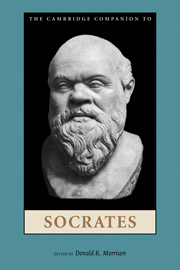Book contents
- Frontmatter
- 1 The Rise and Fall of the Socratic Problem
- 2 The Students of Socrates
- 3 Xenophon and the Enviable Life of Socrates
- 4 Socrates in Aristophanes’ Clouds
- 5 Socrates and the New Learning
- 6 Socratic Religion
- 7 Socrates and Democratic Athens
- 8 Socratic Method
- 9 Self-Examination
- 10 Socratic Ignorance
- 11 Reconsidering Socratic Irony
- 12 Socratic Ethics and the Socratic Psychology of Action
- 13 Socrates and Eudaimonia
- 14 Socrates’ Political Philosophy
- 15 Socrates in Later Greek Philosophy
- Socrates Bibliography
- Index of Names and Subjects
- Index of Passages
10 - Socratic Ignorance
Published online by Cambridge University Press: 28 March 2011
- Frontmatter
- 1 The Rise and Fall of the Socratic Problem
- 2 The Students of Socrates
- 3 Xenophon and the Enviable Life of Socrates
- 4 Socrates in Aristophanes’ Clouds
- 5 Socrates and the New Learning
- 6 Socratic Religion
- 7 Socrates and Democratic Athens
- 8 Socratic Method
- 9 Self-Examination
- 10 Socratic Ignorance
- 11 Reconsidering Socratic Irony
- 12 Socratic Ethics and the Socratic Psychology of Action
- 13 Socrates and Eudaimonia
- 14 Socrates’ Political Philosophy
- 15 Socrates in Later Greek Philosophy
- Socrates Bibliography
- Index of Names and Subjects
- Index of Passages
Summary
Socrates famously claims to lack knowledge or wisdom. This profession of ignorance seems to raise a number of questions. There is the question of what precisely he takes himself to be ignorant of – or, conversely, what categories of knowledge, if any, he takes himself to have. There is also the question of what precisely it means for him to profess ignorance – or, conversely, what conception of knowledge he is presupposing, such that he considers himself not to have knowledge (at least on some subjects). And there is the question of Socrates’ attitude toward his supposed ignorance: is it a matter for regret or despondency, or are there, in his view, positive aspects to being in such a state? While I believe that some progress can be made, and indeed has been made, on these questions, the picture that will emerge from this discussion is not as neat and tidy as are the treatments of this topic by some other scholars.
As with all discussions of Socrates, it is necessary to begin by making clear who is meant by “Socrates.” I shall be speaking almost entirely of the character Socrates as portrayed in a certain subsection of Plato’s dialogues. The Socrates of Xenophon at one point disparages inquiry into the physical world, in part on the basis that neither he nor anyone else can have knowledge of such matters (Memorabilia 1.1.12–15). But Xenophon’s Socrates never professes ignorance about the matters that he mainly discusses, and that he considers it especially important to study, namely ethical matters.
- Type
- Chapter
- Information
- The Cambridge Companion to Socrates , pp. 215 - 236Publisher: Cambridge University PressPrint publication year: 2010
- 5
- Cited by



